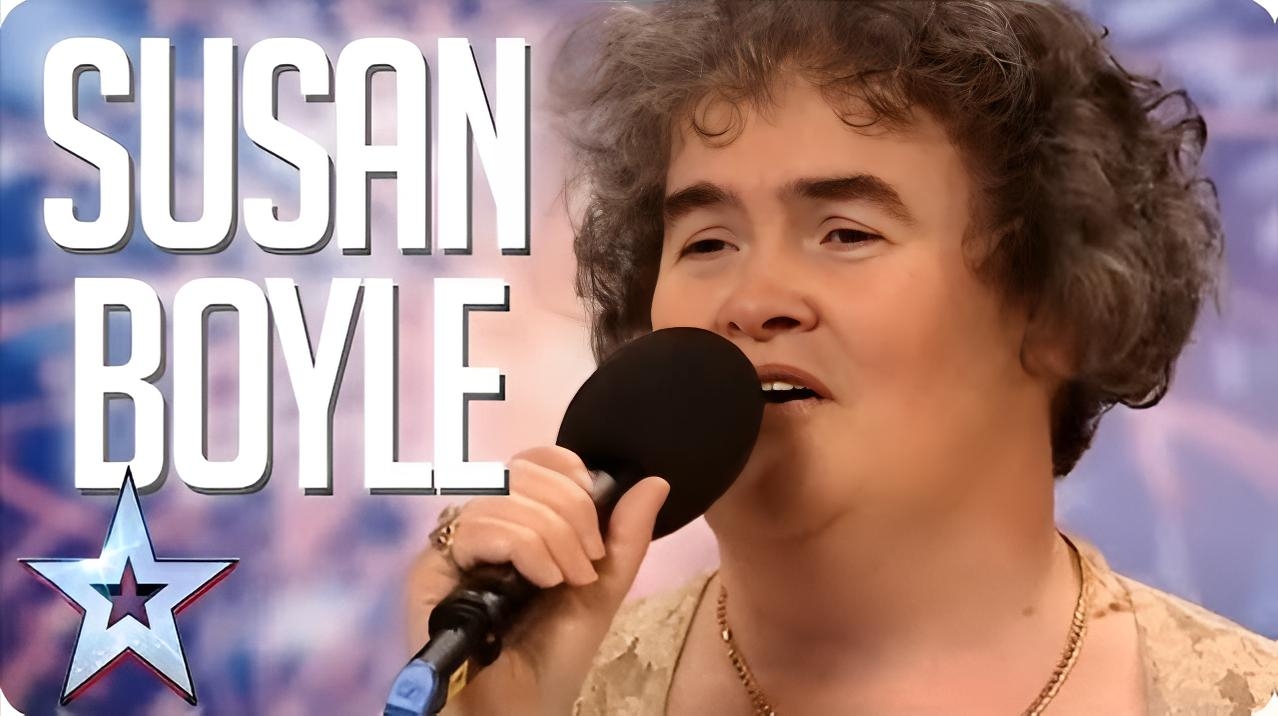The cameras were already rolling when Susan Boyle stepped into the spotlight, but she hardly seemed like a woman ready to be broadcast to millions. At 47 years old, dressed in a beige lace dress that might have looked more suited for a Sunday service than a talent show, she radiated an awkward humor. Her curly hair was slightly untamed, her smile wide, her eyes gleaming with both mischief and nerves. She carried herself with the kind of openness rarely seen on a stage designed for spectacle.
The audience shifted restlessly. Some chuckled outright. Others whispered their doubts. When Susan announced to the panel of judges—Simon Cowell, Piers Morgan, and Amanda Holden—that her dream was to become a professional singer like Elaine Paige, the auditorium rippled with laughter. It was as though the idea itself was absurd. But Susan didn’t shrink. Instead, she tilted her chin proudly and joked about her age and her village, deflecting the mockery with a humor only she could deliver. She was used to being underestimated.
Still, beneath her confidence, something far deeper flickered in her eyes: defiance mixed with longing. Susan had carried her dream for decades, quietly nurturing it in the solitude of her small Scottish home. She had sung in churches, local competitions, and alone in her bedroom mirror, but she had never stood before such a merciless stage. And yet here she was.
The First Note
When the backing track swelled with the opening bars of “I Dreamed a Dream” from Les Misérables, Susan closed her eyes for the briefest second. It was as if she needed to anchor herself, not to the audience, but to the memory of why she was here. Then, she opened her mouth.
The first note was soft, measured—but perfectly pitched. It cut through the skepticism like sunlight piercing a storm. Within seconds, the entire energy of the room shifted. Gasps rang out. Faces that had been smirking turned still, awed.
Her voice was rich, warm, and commanding. Each lyric carried not just melody, but the weight of lived experience—the struggles, loneliness, and quiet resilience of a woman who had never stopped believing in her dream, even when the world had laughed at her.
By the time she reached the soaring high notes, her voice filled the theater like an unstoppable tide. Simon Cowell, usually the embodiment of detached cynicism, leaned forward in disbelief. Piers Morgan’s eyes widened, his skepticism erased. Amanda Holden pressed her hand against her chest, visibly moved. And the audience, who moments earlier had mocked her, was now rising to its feet in thunderous applause.
It was more than singing. It was a reclamation of dignity. A reminder that talent, beauty, and worth don’t fit into society’s neat little boxes.
A Room Transformed
As the final note rang out, the room erupted. The applause was so loud it seemed to shake the rafters. People whistled, cheered, shouted her name. Some even wiped away tears. Susan, ever humble, gave a little wiggle of her hips in triumph—a gesture that sent the crowd into even greater frenzy. She was beaming, but her smile wasn’t one of arrogance; it was the radiant joy of someone finally, finally being seen.
Simon Cowell was the first to speak, and for once, his trademark smirk had been replaced with genuine awe. “Susan,” he said slowly, almost reverently, “that was extraordinary. Honestly, it was stunning.”
Piers Morgan followed quickly, his voice laced with admiration. “When you stepped out here, nobody expected that. But you’ve proven every single one of us wrong. That was the biggest surprise I’ve had in three years on this show.”
Amanda Holden, her eyes glistening, leaned toward Susan. “I am so thrilled for you. That performance was absolutely magical.”
And in that moment, Susan Boyle—an ordinary woman from Blackburn, Scotland—had become something else entirely. She was a global sensation, a symbol of hope, proof that it is never too late, and that dreams don’t expire with age.
The Ripples Beyond the Stage
What happened on that stage did not end with applause. Overnight, Susan’s audition became a viral phenomenon, watched by millions around the world. People from Tokyo to Toronto, from Delhi to Dublin, felt something stir in their hearts as they replayed her performance again and again.
For many, Susan’s story was personal. She reminded them of their own forgotten dreams, the talents left unexplored, the quiet voices silenced by doubt or ridicule. She became a beacon—not just of talent, but of perseverance and authenticity.
Even Simon Cowell admitted later that it was one of the most unforgettable auditions he had ever witnessed. Susan Boyle wasn’t just another contestant; she was a revelation.
Years Later
The legacy of that single audition continued to ripple outward. Susan went on to release albums that topped charts, selling millions worldwide. But perhaps more important than her commercial success was the emotional impact she carried with her.
Whenever she sang, audiences remembered that magical first moment: the underdog defying every expectation, the voice that silenced laughter and summoned awe.
And Susan herself never lost sight of the truth. “It wasn’t about fame,” she would later say in interviews. “It was about proving to myself that I could do it—that I was more than people thought I was.”
An Enduring Magic
Susan Boyle’s audition wasn’t just television history. It was a cultural reset. A reminder that extraordinary talent often hides behind ordinary appearances. That dreams don’t wither with age. And that sometimes, the purest magic happens when the world least expects it.
Even years later, when people revisit that clip of her singing “I Dreamed a Dream”, the goosebumps return. The tears prick again. The standing ovation echoes across time.
Because what Susan Boyle gave the world wasn’t just a song.
It was hope.
